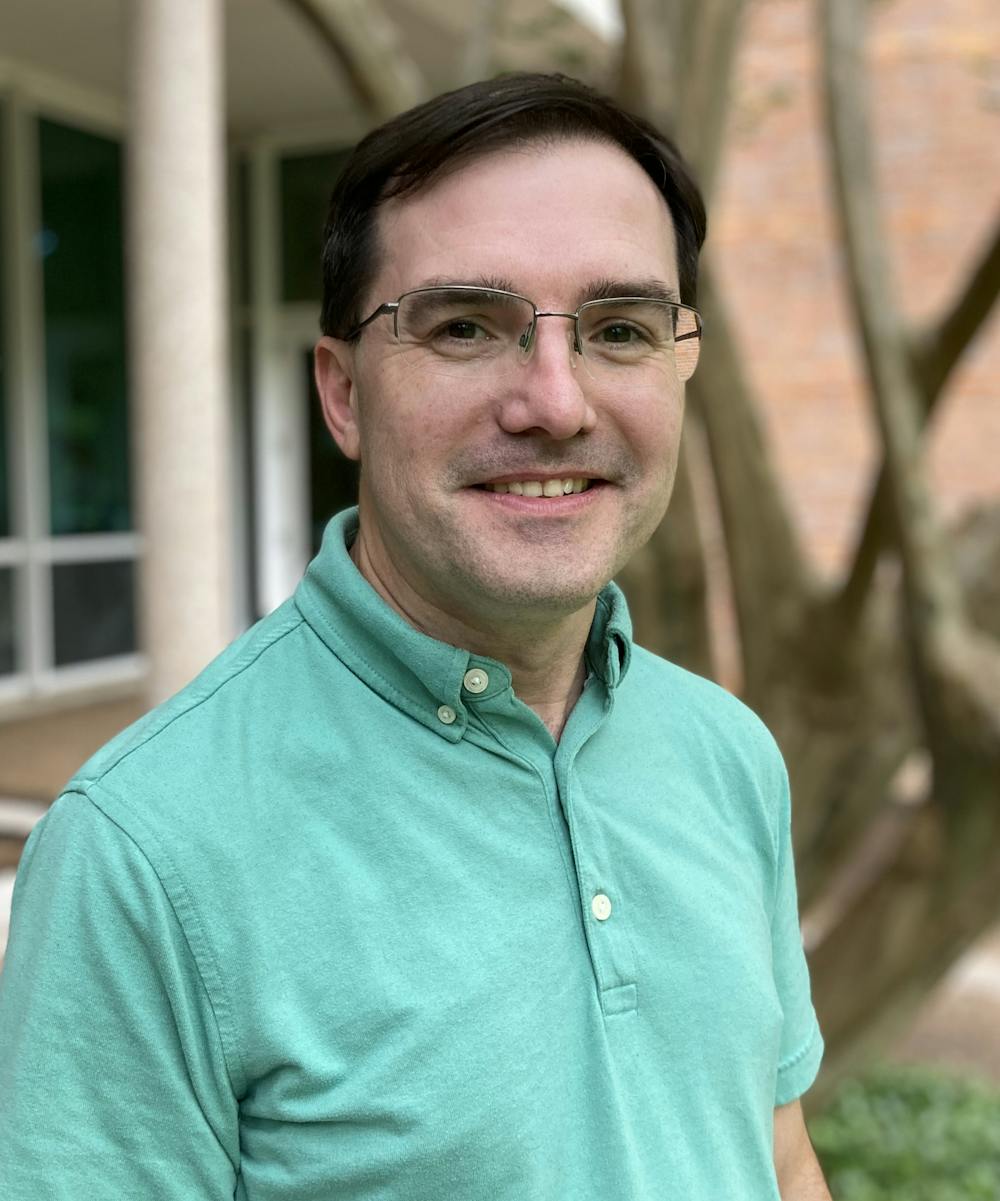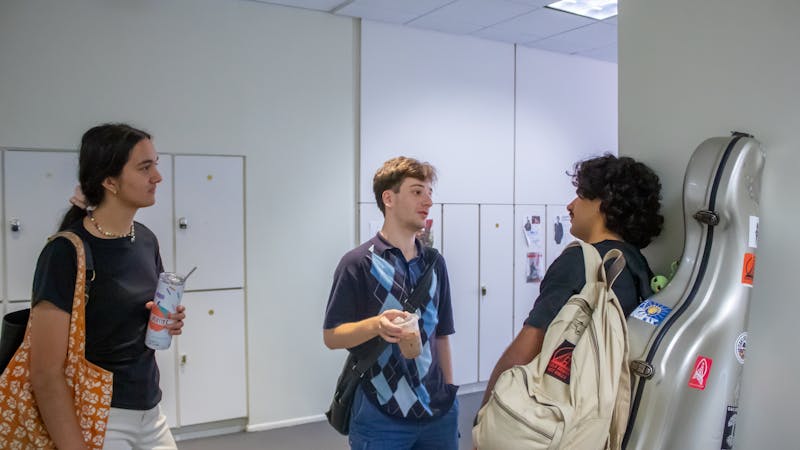Rice professors tackle teaching, tenure

Jamie Catanese stands outside the Anderson Biological Laboratories with his students as they present research posters for his BIOS 211 class. With his hands down at his sides, he snaps his fingers and throws out questions to familiar students passing by. One student comes to him with an empty major declaration form, and he fills it out without hesitation, laughing and cracking jokes as he signs his name.
“Coming out of Micro?” Catanese, an associate teaching professor of biosciences, asked one student. “315?”
Catanese is one of 341 non-tenure track instructional faculty at Rice whose primary foci are educating undergraduates. In 2013, Rice instituted the teaching track, a promotable professional track which allows professors to build a career out of teaching and pedagogical research.
Initially, non-tenure track positions only last up to three years, but dedicated faculty members can stay on as professors or associate professors for up to eight years if Rice renews their contract. Outside of these traditionally tenure track positions, non-tenure track promotable positions include research professors, teaching professors, lecturers, professors in the practice and instructors; these positions have no time limit.
Sandy Parsons has been teaching at Rice since before the new track was instated, and she said she’s grateful for the fact that Rice has recognized her desire to make a career out of teaching.
“When you have a track that’s designated for teaching faculty, then you’re more likely to have teachers who stay,” Parsons, an associate teaching professor of psychological sciences, said. “I have been here for 13, 14 years, and I like knowing that the university recognizes I want to be here for my career.”
Parsons said that she was attracted to the idea of a teaching job as a graduate student because of its relative flexibility. When she originally applied for a job at Rice, she was brought on as a temporary hire to fill in for a professor who had recently left the psychological sciences department. After working as a lecturer for a few years, Parsons was eventually promoted to the teaching track. Since then, she has also become a resident associate for Will Rice College and the director of undergraduate studies in the psychological sciences.
“One of the things that I really love about teaching at Rice is that the students are so sharp,” Parsons said. “Every single semester, even after teaching the same class many times, there are new questions that come up, and I think that’s really exciting.”
Catanese said that most of his educational career was spent doing research, but a cutthroat environment exacerbated by the 2007 financial crisis turned him away. He began teaching during his postdoctoral research fellowship at Baylor College of Medicine when a colleague notified him of an opening to teach online for the University of Phoenix. His primary investigator at Baylor also gave him the opportunity to give guest lectures, and when a teaching job opened up at Rice in 2015, he said he knew it was perfect for him.
“Research is … a lot of hard work and a little bit of luck,” Catanese, the recipient of this year’s George R. Brown Award for Teaching Excellence, said. “I got to see it up close and personal for 10 years as a postdoc … I didn’t want that kind of pressure.”
“I think the biggest thing I enjoy about teaching is interacting with the students, because I learn from them almost as much as they learn from me,” Catanese continued. “I love thinking about how people think, how they get to an answer, I love watching the ‘aha’ moments and making those connections. It’s absolutely fantastic.”
While Catanese no longer publishes his own biological research, he and other teaching faculty at Rice engage in pedagogical research aimed at improving their curricula and teaching styles.
“Every semester I’m tweaking, every semester I am modifying, adapting some aspect of the class [or] an assignment, because I see roadblocks,” Catanese said. “Every student has that potential and every student should get that attention.”
James Hwang, a former student of and current teaching assistant for Catanese, said he appreciates Catanese’s meticulously engineered approach to teaching.
“I really like the style he has and the format, especially for the [BIOS] 211 class,” Hwang, a McMurtry College senior, said. “It’s very hands-off in terms of letting the students figure [things] out … but also there’s enough guidance in terms of the course structure and assignments … that balance of hands-off versus guidance is great.”
Spanish lecturer Luján Stasevicius said her foray into teaching was accidental. Originally planning to get her bachelor’s degree in literature, she discovered her knack for teaching during group study sessions. Once she realized her ability, she said there was no turning back.
“My classmates started looking for me when they didn’t understand something, and I was like, ‘Hmm, there must be something here,’” Stasevicius continued. “I did a specialization in teaching, and I discovered that I really liked sharing knowledge and trying to bring people together.”
Associate teaching professor of English Ian Schimmel originally came to Rice as a writer in residence in 2011 after earning his MFA in creative writing from the University of Houston. During his first two years at Rice, a number of the creative writing faculty retired and Schimmel shouldered the responsibility of teaching their classes. He’s stayed here ever since.
“I always valued my professors in college who equalized themselves and were open to me, and who would build a relationship on trust,” Schimmel, also a resident associate at Duncan College, said. “Whatever the topic of those courses, that’s where I did the best.”
Hwang and Schimmel agreed on the need for teaching faculty within universities today. Great teachers are necessary for learning and student growth, Hwang said, and Schimmel said teaching faculty are more accessible with student-centered priorities.
“I feel like I’ve connected more with non-tenure [track] professors than tenure [track] professors,” Hwang said.
“Teaching faculty tend to be more accessible,” Schimmel said. “They tend to be the people who have the time to put into your work and the bandwidth to answer those late emails.”
Whether due to flexibility, a friendly environment or natural talent, non-tenure track instructional faculty come to teaching for a number of reasons. But professors agree the best part of their job is the students.
“It doesn’t matter if you’re paid to do research or not,” Stasevicius said. “We are nothing if we don’t have students.”
More from The Rice Thresher

Over 1,000 students petition against new meal plan
When Konstantin Savvon opened the Housing and Dining email announcing the new unlimited meal plan, he was instantly concerned about the impact on off-campus students like himself.

Rice shuttle bus drivers reflect on changes and connections behind the wheel
Martine Stewart has spent the past year behind the wheel of Rice’s greater loop shuttle, circling the inner campus from the early morning to late afternoon. She said she has come to recognize many of her regular riders – not just their faces, but the exact spots where they wait to be picked up.

Music majors at Rice’s Shepherd School tackle busy schedules, future goals
Cirdan Vonnahme began playing the cello at 4 years old. After winning his first competition at 11 and debuting with an orchestra, he realized he wouldn’t mind playing the cello for life.

Please note All comments are eligible for publication by The Rice Thresher.